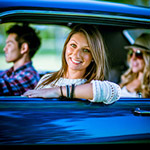
Name: David Peterson
From: Peoria, AZ
Votes: 0
Drinking, Driving, and Thud
Drinking, Driving, and Thud
David Peterson
Thud is the sound my head made when it hit the ground. At least that is probably the sound it made. I do not know because I was passed out. “Buddy, buddy, are you okay?” That is what I woke up to, my face against the rough floor in my high school Drivers Ed class. I thought I had gotten used to seeing gory pictures in that class, but I guess not. We had been watching a video of the medical personnel helping a patient after a drunk driving accident. The patient’s arm was badly injured, and seeing the bones and joints of his elbow rotate without skin was a bit too much for me.
I had grown accustomed to seeing gory stuff like this from horrible accidents. Intriguing guests visited my class shared shocking stories: people like firefighters, post-accident photographers, and those who had gotten into accidents themselves. While seeing those gory photos and videos was never pleasant, I am forever grateful for the knowledge it gave me of the dangers of driving–specifically, the foolishness of intoxicated driving.
Why do people continue to drink and drive? It’s one of the leading causes of death in the united states. Horror stories of destroyed families and lives must have been heard by everybody at least once or twice before they reach the age of driving or of drinking.
I believe its because of a “’Live now, think about it later” philosophy that has become so common with more and more generations. The “yolo” movement (You Only Live Once) was the phrase that came about in my middle school years. This philosophy to live a life full of risks with not a second thought of the consequences never sat right with me. It became common place for middle schoolers and high schoolers to shout “yolo” and then do something risky and often dumb, sometimes dangerous. While it’s true that taking risks is something that must be done in one’s life, there are risks that are not necessary.
The philosophy of Yolo was never “Take the important risks to have a happy life” but rather “Do whatever you want, no need to worry about the consequences to myself or others.” This is the mode of foolish thinking that propels people still drink and drive, despite being informed about potential and common consequences.
The other school of thought that is common for intoxicated drivers is the “But not to me, I’m different” philosophy. The idea that everyone is unique is very true. However, often the word unique is replaced with special and is used in the context that natural consequences do not apply to them. Statistically, not every person who drinks and drives gets in an accident, and because it’s not an absolute, people who are trapped in the “I’m Special” way of thinking can begin to think, “I’m Exempt.”
With this immortality complex, they are bound to drink and drive more often, or maybe sometimes this way of thinking makes them do it “just this once.” Natural consequences obviously do not deem them as special/exempt, and eventually accidents will happen as they drink and drive.
If every driver could see what I saw in my Drivers Ed class, I feel that more people would not make the choice to drink and drive. Improving awareness can be more of a grand-scale solution to the problem. Teaching people to avoid these dangerous philosophies would help. But on a smaller scale, there are ways I can help. Ways for me to lift this problem where I stand. As someone committed to never drinking and driving, I can make the choice to be an influence to those around me.
As great as seminars and classes are, frankly, they do not match up to the influence that friend-to-friend, peer-to-peer conversations can have. I can have a personal influence on those around me. I can put my foot down when someone around me tries to drink and drive. I can make sure that if there is alcohol, there is also a designated driver. I can also be that designated driver. I can go out of my way to make sure my friends have my phone number and confidence that I will pick them up if needed. I can be the safety line and the safety wall that helps protect my friends and myself from the dangers of intoxicated driving. I will be a force for change.
 This is a mandatory Driver Education Course for Teenagers under 18 Years Old. Our online drivers ed course will fulfill your 30 hour mandatory driver’s education requirement. You can complete the required driver improvement course anywhere with an internet connection and on any device.
This is a mandatory Driver Education Course for Teenagers under 18 Years Old. Our online drivers ed course will fulfill your 30 hour mandatory driver’s education requirement. You can complete the required driver improvement course anywhere with an internet connection and on any device. Our State/County Court and DMV Licensed Traffic School courses are top-rated. It’s easy and online, and a great way to comply with requirements to clear your DMV record after an accident or ticket. Our course is a 100% online traffic school, thus making it possible for you to take your State/County Court and DMV required traffic school course at a convenient time and place via the computer or mobile device.
Our State/County Court and DMV Licensed Traffic School courses are top-rated. It’s easy and online, and a great way to comply with requirements to clear your DMV record after an accident or ticket. Our course is a 100% online traffic school, thus making it possible for you to take your State/County Court and DMV required traffic school course at a convenient time and place via the computer or mobile device.